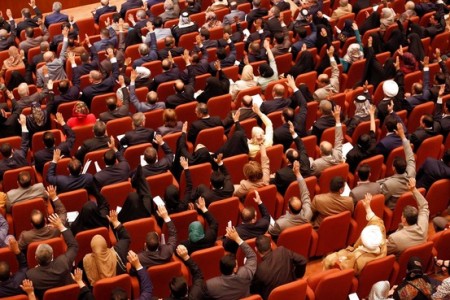After more than three months of deliberations and maneuvers, Iraq’s Parliament has approved a new Government, including Shia Prime Minister Haidar al-Abadi and Sunni and Kurdish Deputy Prime Ministers.
Al-Abadi was finally named as Prime Minister last month after his predecessor, Nuri al-Maliki, tried to cling onto power amid an insurgent offensive that captured major cities such as Fallujah, Mosul, and Tikrit. Parliament was also beset by rivalries that postponed meetings and stalemated others.
Saleh al-Mutlaq and former Foreign Minister Hoshyar Zebari were approved as the Sunni and Shia Vice Presidents.
US Secretary of State John Kerry praised the “major milestone” of what he said was an inclusive Government, saying he will travel to the Middle East on Tuesday to build “the broadest possible coalition of partners” to defeat the Iraqi insurgency, led by the jihadist Islamic State.
Abadi pledged to fill the posts of Interior and Defence Minister within a week.
Former PM Ibrahim al-Jaafari was named Foreign Minister and Adel Abdul Mahdi of the Shia Islamic Supreme Council of Iraq was appointed Oil Minister
Maliki, former Prime Minister Ayad Allawi, and former Parliamentary Speaker Osama al-Nujaifi, were given ceremonial positions as Vice Presidents.
The new Government faces immediate challenges to its stability, in addition to the threat of the insurgent offensive. The Kurdish bloc has said its participation is conditional on all outstanding issues between Baghdad and Iraqi Kurdistan being resolved within three months. It added the demand that Government pay Kurdistan’s budget allocation, which has been withheld for more than nine months over a dispute about oil revenues, within one week.

